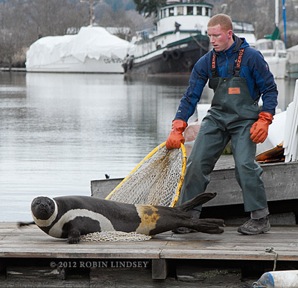Ribbon seal still in Northwest waters
Feb/01/12 03:23 PM
The ribbon seal that has been sighted in Seattle
(Duwamish Waterway - see related story) and Marysville was reported again yesterday in Steamboat Slough in Everett, WA. The animal was seen hauled out on a private dock in the slough and the property owners promptly called NOAA’s Northwest Marine Mammal Stranding Network. A team of biologists from NOAA’s Alaska Fisheries Science Center National Marine Mammal Laboratory and NOAA Fisheries Northwest Regional Office convened at the site. The team was able to handle the animal to conduct a basic health assessment with the assistance of Dr. Steve Johnson from PAWS Wildlife (view video).
The adult male weighed in at 166.5 lbs and measured 55 inches in length. These values are well within the average range of its age class. A small skin sample was collected for genetics analysis and the blood samples collected will be analyzed. This information is very valuable and will allow us to assess the overall health of the animal.

Ribbon seals normally inhabit the North Pacific Ocean, especially the Bering and Okhotsk Seas. They have also been observed in parts of the Arctic Ocean, including the Chukchi, easter Siberian and western Beaufort Seas. During the winter months, ribbon seals range throughout the North Pacific Ocean, but have been previously observed as far south as California. While this is a rare occurrence, the animal likely arrived here on its own and will hopefully make his way back to the Bering Sea soon. They are strongly associated with sea ice for mating, whelping pups and molting from mid-March through June. The rest of the year is spent at sea. Ribbon seals are deep diving seals and can dive to depths in excess of 2000 feet. They primarily feed on pollock and herring as well as some squid species.
We encourage the public to continue to report sightings of this animal to NOAA’s Marine Mammal Stranding Specialist, Kristin Wilkinson at 206-526-4747.
View an online still image gallery of the ribbon seal and the health examination by researchers.
Tags: ribbon seal








